Negative views of China have become more common in the United States in recent years, and a new Pew Research Center survey shows that Americans also widely see China as the greatest threat facing their nation.
Pew Research Center has a long history of measuring which countries are seen as key threats and allies – both among Americans and among foreign publics.
For this analysis, we surveyed 10,329 U.S. adults from May 30 to June 4, 2023. Everyone who took part in this survey is a member of Pew Research Center’s American Trends Panel (ATP), an online survey panel that is recruited through national, random sampling of residential addresses. This way, nearly all U.S. adults have a chance of selection. The survey is weighted to be representative of the U.S. adult population by gender, race, ethnicity, partisan affiliation, education and other categories. Read more about the ATP’s methodology.
Respondents were each asked two questions. First, they were asked “What country do you think is the United States’ most important ally?” They then could type any response into a text box or select one of two explicit options presented: “No country” or “Not sure.” Second, they were asked “What country do you think poses the greatest threat to the U.S.?” with an identical format for responding.
Center researchers then took the verbatim responses and coded them according to the following rules:
- If a respondent mentioned more than one country, only the first one mentioned was recorded as a substantive answer.
- Mentions of “Korea” were coded as South Korea on the allies question and North Korea on the threats question.
- Mentions of “USSR” were coded as Russia.
- Responses that mentioned specific past or present leaders (e.g., Kim Jong Un or Donald Trump) were coded to reflect the countries that those people lead or led.
- Mentions of “CCP” were coded as China.
- Substantive answers that were not specific countries were coded as Other, including answers like “all of them,” “mean ones” or “globalists.”
- Mentions of “itself,” “us,” “our government,” “ourselves” or similar verbatim responses were coded as the United States. Mentions of U.S. political parties or ideological groups (e.g., the GOP, liberals, etc.) were also coded as the United States.
- Responses that named groups of countries (e.g., African countries, European countries) were coded as Other. Responses that named specific organizations (e.g., the EU, NATO) were coded as the organization.
Follow-up questions for both the alliance question and the threat question asked respondents to think about the specific country they had just named.
Here are the questions used for the report, along with responses, and the survey methodology.
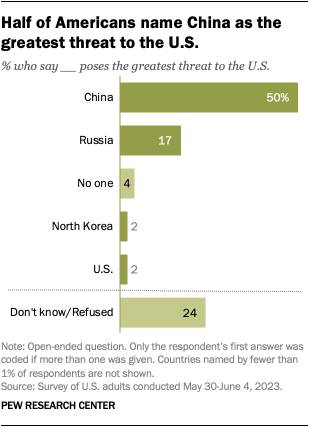
- In an open-ended question allowing Americans to name which country they see as the greatest threat to the U.S., 50% name China – almost three times the share who name Russia (17%).
- Another 4% say no country poses the greatest threat to the U.S.
- Only 2% of Americans name North Korea – and the same share describe the U.S. itself as the greatest threat.
No other country apart from China, Russia, North Korea or the U.S. itself is named by more than 1% of Americans as the greatest threat facing their nation. Nearly a quarter of respondents (24%) provided no response, which is not uncommon for open-ended questions.
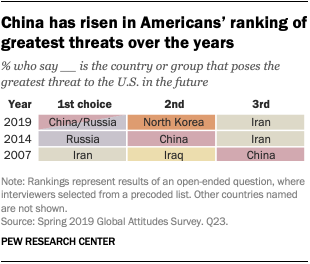
Over time, the Center has changed the way we ask about the greatest threats to the U.S., making it difficult to compare responses from year to year. Still, Americans have not always seen China as the top threat to the United States. When we last asked a question of this sort in 2019, equal shares of Americans pointed to China and Russia as the greatest threat facing their country. In 2014, Russia was at the top of Americans’ list as the greatest threat to the U.S., while in 2007, it was Iran.
Partisan differences
Today, both Democrats and Republicans identify China as the greatest threat facing the country, but there are nonetheless significant partisan and ideological differences on this question.
Republicans and Republican-leaning independents are more likely than Democrats and Democratic-leaning independents to name China as the greatest threat to the United States (63% vs. 40%). And conservative Republicans are much more likely than moderate and liberal Republicans to say this (74% vs. 47%).
The opposite pattern appears when it comes to Russia: Liberal Democrats are the ideological group most likely to see Russia as the greatest threat to the U.S., while conservative Republicans are the least likely to say this.
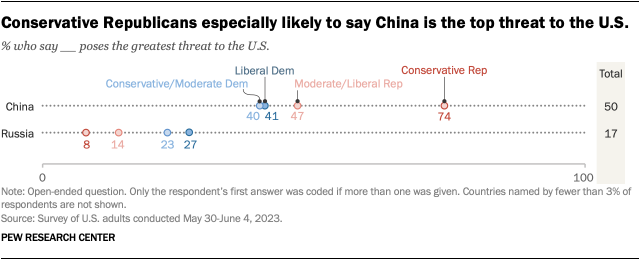
Age, gender differences
Some 61% of Americans ages 65 and older name China as the greatest threat facing the U.S., compared with 36% of those 18 to 29. Men are also more likely than women to name China (59% vs. 42%).
In the case of Russia, there are no significant age differences: Americans ages 18 to 29 are about as likely as those 65 and older to see Russia as the greatest threat to the U.S. (18% vs. 15%). When it comes to gender, women are slightly more likely than men to name Russia (19% vs. 15%).
Perceptions of China and Russia as an economic and security threat
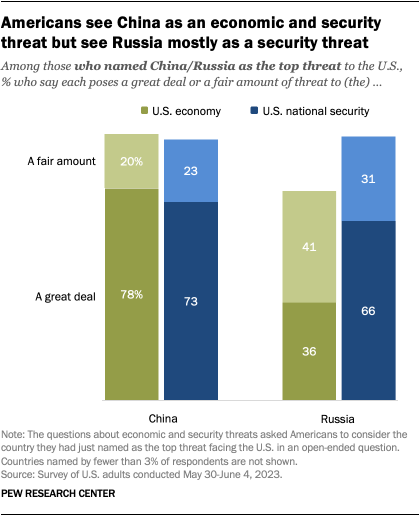
After asking respondents to name the country they see as the biggest threat to the U.S., the survey asked Americans two follow-up questions. These questions explore how much Americans see each country as a threat to the U.S. economy and as a threat to U.S. national security, respectively.
Among those who name China as the greatest threat facing the U.S., nearly all see China as posing at least a fair amount of threat to both America’s economy and its national security. In fact, around three-quarters say China poses a great deal of threat to both.
In contrast, while many Americans see Russia as posing at least a fair amount of threat to the U.S. economy and national security, fewer say it poses a great deal of threat, particularly when it comes to the U.S. economy. Only 36% of Americans who consider Russia to be America’s primary international threat say it poses a great deal of threat to the U.S. economy. Around two-thirds of Americans who see Russia as the top threat (66%) say it poses a great deal of threat to U.S. national security.
Which country is the top ally of the U.S.?
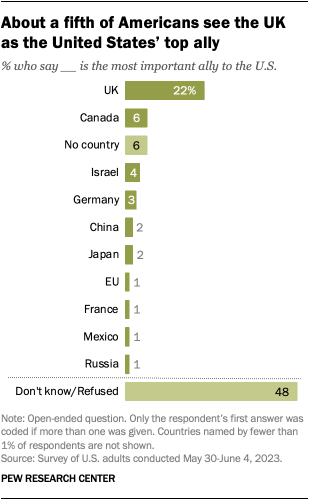
The survey also asked Americans in a separate open-ended question which country is the most important ally to the United States. Around half of respondents (48%) did not provide a substantive answer.
Among those who offered a substantive response, one “special relationship” stands out: Around a fifth of Americans (22%) name the United Kingdom as their country’s most important ally. This is nearly four times the share who name America’s northern neighbor, Canada (6%). Fewer name Israel (4%), Germany (3%), China (2%), Japan (2%), the EU (1%), France (1%), Mexico (1%) or Russia (1%).
Due to changes in the way we ask this question, we’re unable to make direct comparisons to past surveys. But, when we’ve asked Americans about national allies in the past, the public has consistently named the UK above all other countries. Canada and Israel have also been frequently mentioned since 2007, and the EU has also ranked highly.
Partisan, age differences
Partisan differences over which country is the greatest ally of the U.S. are relatively muted. Republicans and Republican-leaning independents are more likely than Democrats and Democratic-leaning independents to name the UK (26% vs. 21%) and Israel (8% vs. 1%). Over three-quarters of respondents who named Israel are conservative Republicans (79%). Democrats are slightly more likely than Republicans to name Canada (9% vs. 5%) and Germany (4% vs. 1%).
Older Americans are much more likely than younger Americans to see both the UK and Israel as America’s top ally. Younger Americans are somewhat more likely than their older counterparts to say the U.S. has no allies; they are also significantly less likely to offer a response on this question.
Perceptions of what makes for a strong alliance
The survey also asked Americans how important each of the following are for America’s relationship with its allies: security and defense ties, economic ties and shared values.
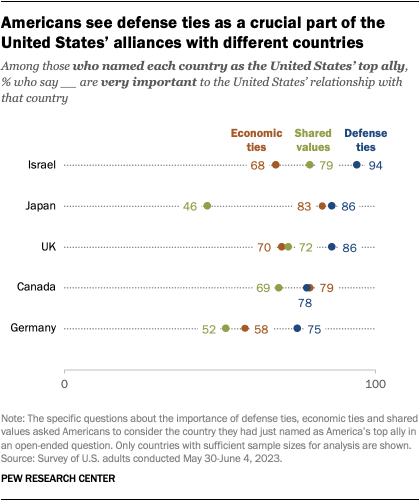
For each named country, defense ties are seen as key. For example, 94% of those who name Israel as America’s top ally say defense ties are very important to the U.S.-Israel relationship. At least three-quarters of respondents say the same for each of the other countries commonly named as America’s top ally.
The public also sees economic ties as relatively important. For most countries named, at least seven-in-ten Americans say economic ties are very important for the United States’ relationship with that country. In the cases of Japan and Canada, Americans say economic ties are about as important as defense ties.
For three of the most-named countries, Americans see shared values as less important than defense or economic ties. For example, fewer than half of those who name Japan as America’s top ally (46%) say shared values are very important for the U.S.-Japan relationship. Israel, however, is a notable exception: More Americans see shared values as very important to the U.S.-Israel relationship than say the same about economic ties (79% vs. 68%).
Note: Here are the questions used for the analysis, along with responses, and the survey methodology.



